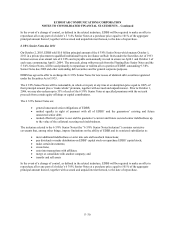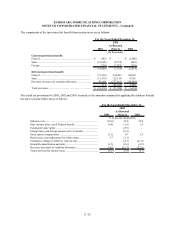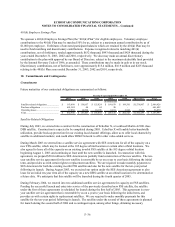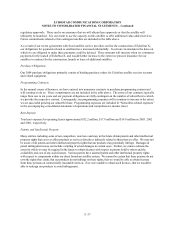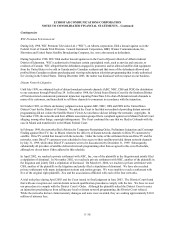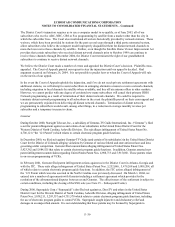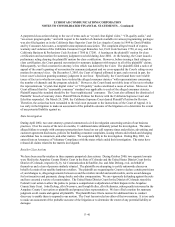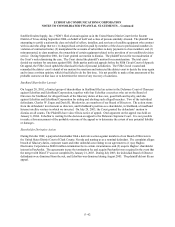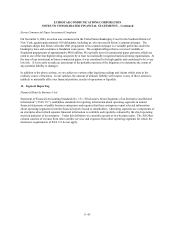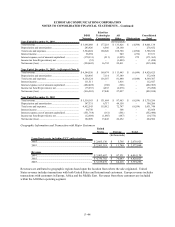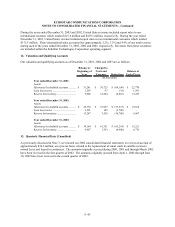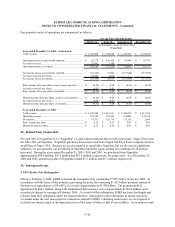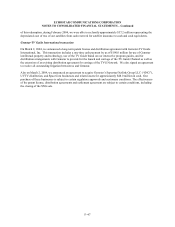Dish Network 2003 Annual Report Download - page 105
Download and view the complete annual report
Please find page 105 of the 2003 Dish Network annual report below. You can navigate through the pages in the report by either clicking on the pages listed below, or by using the keyword search tool below to find specific information within the annual report.ECHOSTAR COMMUNICATIONS CORPORATION
NOTES TO CONSOLIDATED FINANCIAL STATEMENTS – Continued
F–38
Contingencies
WIC Premium Television Ltd.
During July 1998, WIC Premium Television Ltd. (“WIC”), an Alberta corporation, filed a lawsuit against us in the
Federal Court of Canada Trial Division. General Instrument Corporation, HBO, Warner Communications, Inc.,
Showtime and United States Satellite Broadcasting Company, Inc. were also named as defendants.
During September 1998, WIC filed another lawsuit against us in the Court of Queen’s Bench of Alberta Judicial
District of Edmonton. WIC is authorized to broadcast certain copyrighted work, such as movies and concerts, to
residents of Canada. WIC alleged that the defendants engaged in, promoted, and/or allowed satellite dish equipment
from the United States to be sold in Canada and to Canadian residents and that some of the defendants allowed and
profited from Canadian residents purchasing and viewing subscription television programming that is only authorized
for viewing in the United States. During December 2003, the matter was dismissed with no impact on our business.
Distant Network Litigation
Until July 1998, we obtained feeds of distant broadcast network channels (ABC, NBC, CBS and FOX) for distribution
to our customers through PrimeTime 24. In December 1998, the United States District Court for the Southern District
of Florida entered a nationwide permanent injunction requiring PrimeTime 24 to shut off distant network channels to
many of its customers, and henceforth to sell those channels to consumers in accordance with the injunction.
In October 1998, we filed a declaratory judgment action against ABC, NBC, CBS and FOX in the United States
District Court for the District of Colorado. We asked the Court to find that our method of providing distant network
programming did not violate the Satellite Home Viewer Act and hence did not infringe the networks’ copyrights. In
November 1998, the networks and their affiliate association groups filed a complaint against us in Miami Federal Court
alleging, among other things, copyright infringement. The Court combined the case that we filed in Colorado with the
case in Miami and transferred it to the Miami Federal Court.
In February 1999, the networks filed a Motion for Temporary Restraining Order, Preliminary Injunction and Contempt
Finding against DirecTV, Inc. in Miami related to the delivery of distant network channels to DirecTV customers by
satellite. DirecTV settled that lawsuit with the networks. Under the terms of the settlement between DirecTV and the
networks, some DirecTV customers were scheduled to lose access to their satellite-provided distant network channels
by July 31, 1999, while other DirecTV customers were to be disconnected by December 31, 1999. Subsequently,
substantially all providers of satellite-delivered network programming other than us agreed to this cut-off schedule,
although we do not know if they adhered to this schedule.
In April 2002, we reached a private settlement with ABC, Inc., one of the plaintiffs in the litigation and jointly filed
a stipulation of dismissal. In November 2002, we reached a private settlement with NBC, another of the plaintiffs in
the litigation and jointly filed a stipulation of dismissal. On March 10, 2004, we reached a private settlement with
CBS, another of the plaintiffs in the litigation and jointly filed a stipulation of dismissal. We have also reached
private settlements with many independent stations and station groups. We were unable to reach a settlement with
five of the original eight plaintiffs –Fox and the associations affiliated with each of the four networks.
A trial took place during April 2003 and the Court issued its final judgment in June 2003. The District Court found
that with one exception our current distant network qualification procedures comply with the law. We have revised
our procedures to comply with the District Court’s Order. Although the plaintiffs asked the District Court to enter
an injunction precluding us from selling any local or distant network programming, the District Court refused.
While the networks did not claim monetary damages and none were awarded, they are seeking approximately $10.0
million of attorney fees.




